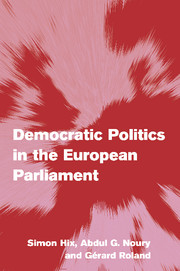Book contents
- Frontmatter
- List of Contents
- List of figures
- List of tables
- List of boxes
- Acknowledgements
- Introduction
- Chapter 1 Development of the European Parliament
- Chapter 2 Democracy, transaction costs and political parties
- Chapter 3 Ideological not territorial politics
- Chapter 4 Participation
- Chapter 5 Trends in party cohesion
- Chapter 6 Agenda-setting and cohesion
- Chapter 7 Who controls the MEPs?
- Chapter 8 Competition and coalition formation
- Chapter 9 Dimensions of politics
- Chapter 10 Investiture and censure of the Santer Commission
- Chapter 11 The Takeover Directive
- Conclusion
- Bibliography
- Index
Chapter 8 - Competition and coalition formation
Published online by Cambridge University Press: 22 September 2009
- Frontmatter
- List of Contents
- List of figures
- List of tables
- List of boxes
- Acknowledgements
- Introduction
- Chapter 1 Development of the European Parliament
- Chapter 2 Democracy, transaction costs and political parties
- Chapter 3 Ideological not territorial politics
- Chapter 4 Participation
- Chapter 5 Trends in party cohesion
- Chapter 6 Agenda-setting and cohesion
- Chapter 7 Who controls the MEPs?
- Chapter 8 Competition and coalition formation
- Chapter 9 Dimensions of politics
- Chapter 10 Investiture and censure of the Santer Commission
- Chapter 11 The Takeover Directive
- Conclusion
- Bibliography
- Index
Summary
Competition between political parties is often considered to be central to modern democracy (e.g. Schumpeter, 1943). Competition provides citizens with a mechanism for choosing leaders and policies and for punishing elected officials for failing to hold to their promises or for being corrupt. Competition provides incentives for elites to develop rival policy ideas and propose rival candidates for office. Democratic contestation can also have a formative effect. In both America and in European countries, the operation of competitive party systems played a central role in the replacement of local identities by national identities (e.g. Key, 1961; Rokkan, 1999).
Political parties, however, are not inherently competitive. For example, in the 1950s Schattschneider (1960), among others, criticised American parties for being ‘unresponsive’ to voters concerns and for failing to ‘mobilise’ around different policy agendas. Similarly, Katz and Mair (1995) famously observed that in many democracies, instead of competing, the main parties now form a ‘cartel’ to secure government office and state funding of their activities.
Similarly, a widely held view of the European Parliament is that the two main political parties, the socialists and the EPP, tend to collude rather than compete for influence and compete over policy outcomes (cf. Kreppel, 2000, 2002b; Hix et al., 2003). These two parties share similar policy preferences on many issues on the EU agenda, such as the social-market model of European regulatory capitalism and further European integration (e.g. Marks and Wilson, 2000).
- Type
- Chapter
- Information
- Democratic Politics in the European Parliament , pp. 147 - 160Publisher: Cambridge University PressPrint publication year: 2007

